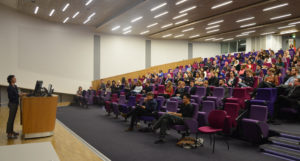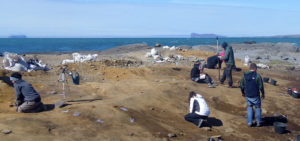As an international offer-holder without any experience in British higher education, I’m sure you have been wondering what classes are like at universities in the UK. Keep reading if you’d like to find out more about the different types of teaching you might be involved during your undergraduate course. This blog post is a follow-up to my ‘5 things you need to know exams in the UK’ article – be sure to check it out if you haven’t done so already!
1. What are lectures?

Lectures are presentations on a particular topic delivered by one or more lecturers (members of academic staff). Teachers usually use PowerPoint presentations and/or handouts and direct you to further readings to engage in after the lecture. The size of lectures really varies, ranging from about 40 to 300 people. They usually last 1 or 2 hours and are recorded which means that you can re-watch them any time on Recap. In order to make the most of lectures, you should bring your laptop or pen and paper to take notes.
2. What are seminars?
Seminars are a more interactive form of teaching that enables you to discuss a particular topic with your peers and tutor. Essentially, they are small-group sessions with 10-30 students and a tutor whose role is to guide the discussion. Unlike lectures, these classes are more engaging and require more preparation and research. You may also be required to deliver a presentation as part of your assessment. These classes are usually 1-hour-long and not recorded.
3. Language classes

If you choose to take up additional language modules through FLC (Foreign Language Centre) you will have 2 or 3 hours of classes per week. Similar to seminars, language classes are very interactive and you’re required to do your homework as well as some additional preparation and practice. These are generally small-group classes with 10-25 students.
4. Tutorials, workshops, fieldwork
Tutorials are small-group meetings involving supervision, feedback and detailed discussion on a particular topic, project or piece of assessed work. Compared to seminars, tutorials place greater emphasis on the role of the tutor in giving direction or feedback.
Practical classes or workshops include the acquisition and practical application of a particular skill or technique. For example, Biology students should expect laboratory classes and Drama students may be involved in preparing material for performance.
Fieldwork is practical work conducted at an external site such as survey work, data collection, excavations and explorations. Courses involving fieldwork include Archaeology, Art History, Biosciences and Geography.
More information regarding teaching methods can be found on the University’s website.
5. Courses with no seminars
You will not necessarily be involved in all types of teaching. For example, Geography modules generally comprise only 2 hours of lectures per week, with no seminars. On the other hand, Social Sciences and Humanities modules usually involve seminars, tutorials and workshops in addition to weekly lectures.
Image sources:
https://www.exeter.ac.uk/media/universityofexeter/studying/newstudents/responsiveimages/alumni-auditorium.jpg
http://humanities.exeter.ac.uk/media/universityofexeter/collegeofhumanities/foreign_language_centre_930.jpg
https://www.exeter.ac.uk/media/universityofexeter/collegeofhumanities/archaeology/ugstudysiteimages/arch_fieldwork5.jpg
